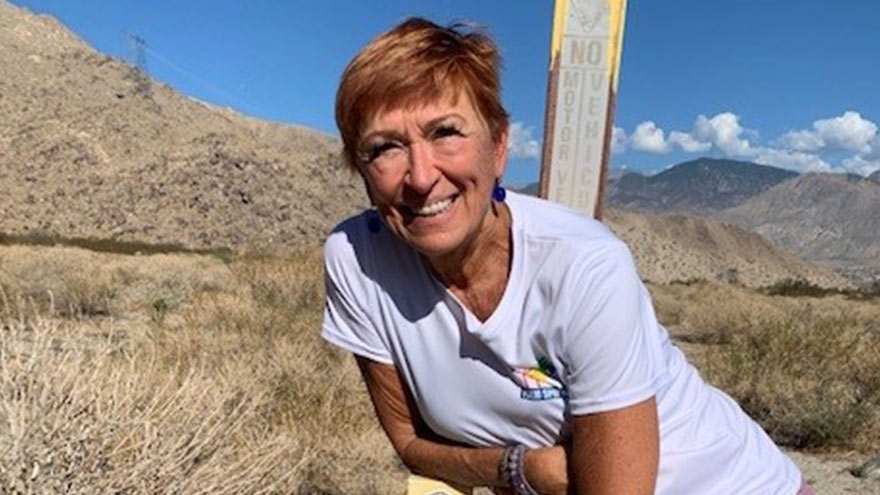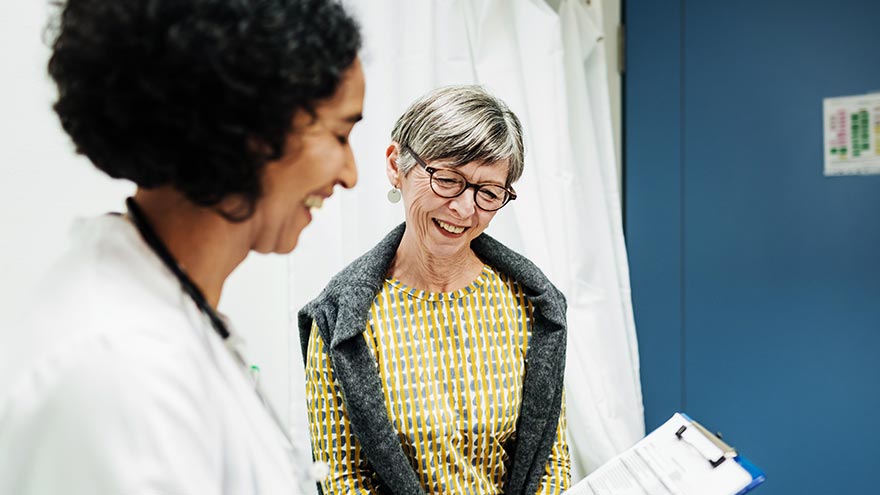Search
-
Getting to Know Stephanie Kruse
There are a lot of impressive titles you can use to describe Stephanie Kruse: entrepreneur, marketer, philanthropist, leader, adventurer, nurse. And now with her planned gift to the Renown Health Nursing Excellence Endowment, she can add one more to the list: a member of the Renown Legacy Society – a group of visionary supporters who have chosen to make a lasting commitment to the future health and wellbeing of northern Nevadans. This generous planned gift comes on the heels of a significant cash gift made to the Nursing Education Fund last summer. Stephanie is an inspiring example of someone who has dedicated her life to helping others. The daughter of a nurse and a retired nurse herself, Stephanie knows the hard work, selflessness and dedication it takes to create a successful business and community. As Chair of the Renown Health Foundation Board of Directors, she also understands the importance of attracting and retaining nurses within a healthcare system. As a way to contribute to a cause near and dear to her heart, she decided to include the Renown Nursing Excellence Endowment as a beneficiary of her retirement plans. “I wanted to honor the memory of my mother, who was a registered nurse in a small-town hospital in Iowa.,” said Stephanie. “I was always very conscious of her passion for providing great care to her patients, and I wanted to provide funding for others interested in nursing.” Across the nation, health systems are facing a shortage of nurses and nursing-related professionals. Renown is proactively implementing programs to build our pipeline of potential future nurses and keep those already in the field. Stephanie’s generous gift will help the endowment provide programs such as training, scholarships, loan repayment and professional development to increase retention and recruitment of prospective nurses. “As nurses, we are entrusted with our patients’ lives,” said Melodie Osborn, Chief Nurse Executive at Renown Health. “We have the privilege of caring for people in their most vulnerable time and helping those who cannot help themselves. Stephanie’s generous gift to the Nursing Excellence Endowment Fund will help us develop new nurses for the future so we can continue to provide care to those in need for generations to come.” No Stranger to Healthcare Long before she found herself leading the Renown Health Foundation Board, Stephanie learned the ins and outs of healthcare. She graduated from nursing school and became a part-time nurse in a Sioux Falls, South Dakota nursing home while attending Augustana College to obtain a degree in journalism and a minor in theater. As part of her journalism program, Stephanie completed an internship in the public relations department of a Sioux Falls hospital, and that led to her accepting a position as director of public relations at a sister hospital. She later was recruited by Saint Mary's Hospital and moved to Reno to be the director of marketing in 1981. She stayed at Saint Mary's for almost 10 years before starting her own company in pursuit of her passion for marketing strategy. Since launching her brand, Stephanie has grown KPS3 to a multi-million-dollar firm with more than 60 staff members. Somehow, she is still able to find time to serve on six (!) volunteer boards, most of which are dedicated to improving access to better health and human services. “I have a soft spot in my heart for organizations who strive against all odds to help those with the greatest needs,” said Stephanie.
-
What Does It Mean to Participate in a Clinical Trial?
Participating in a clinical trial is voluntary and a personal choice. Clinical trials are research studies that involve people and are an important part of patient care. What is a clinical trial? Clinical trials are research studies that involve people, and they are an important part of patient care. There are several different types of clinical trials; some are designed to understand trends in a disease or identify better ways to diagnose a condition, while others determine if a new treatment is safe and works when treating, improving or preventing a health condition. There are over 400,000 clinical trials currently being conducted in the United States, and even more across the world. This includes health conditions such as heart failure, cancer, Parkinson’s Disease, respiratory conditions like COPD, common infections, cystic fibrosis, and many more. Clinical trials lead the healthcare industry to new discoveries that contribute to reliable and exact care, improving healthcare quality and saving lives. Clinical trials are conducted by a team of researchers, including doctors, pharmacists and clinical research coordinators. These research teams are highly skilled in their specialty areas, often providing traditional patient care and seeing research patients in the same day. These teams are responsible for making sure the clinical trial is completed correctly, and their patients are their top priority. Why should I consider participating in a clinical trial? Participating in a clinical trial is voluntary and a personal choice. There are many reasons why patients decide to get involved in clinical research. While many clinical trials are designed for patients who have a certain health condition, many studies also ask healthy volunteers to contribute in order to compare health outcomes. Clinical trials are also for patients at all different stages of their diagnosis. Depending on the specific study, the patient may receive access to a new cutting-edge treatment before it is widely available. When patients join a clinical trial, the research team becomes a health partner dedicated to their health and well-being. When patients join a clinical trial, they make an informed decision in their healthcare by weighing all available options in addition to routine treatments. Research participants know that they are contributing meaningfully and helping other patients like them. Where can I find more information about clinical trials at Renown Health? Renown Health’s mission is to make a genuine difference in the health and well-being of the communities we serve. Renown’s clinical trial portfolio offers leading care options to patients in northern Nevada, close to home, in a variety of specialties. Contact the Renown Clinical Research Office for more information on clinical trials available to you!
Read More About What Does It Mean to Participate in a Clinical Trial?
-
Top 5 Misconceptions About Clinical Trials
There are many misconceptions about clinical research, so we have unpacked a few common myths we hear to help you make an informed decision in your healthcare. Misconception #1: If I join a clinical trial, I’ll just be a guinea pig. Quite the opposite is true! Through honest and respectful conversation, we ensure all participants are informed of the benefits and risks associated with the clinical trial during the informed consent process. Being in a clinical trial is voluntary, and we respect our patients’ decision to join or decline to participate in the clinical trial. You can always change your mind at any time as well. When patients join a clinical trial, they receive an additional team of healthcare professionals, including additional physicians, pharmacists and research coordinators, dedicated to their safety and well-being. This means that clinical trial participants often receive more support than they would in the standard treatment setting. Misconception #2: Clinical trials are too dangerous because they use new treatments that haven’t been tested. We recognize that there are different levels of risk associated with participating in a clinical trial depending on the type of study. However, new treatments are only reviewed through clinical trials after they have gone through extensive testing. New treatments that do not show promising results for safety and potential benefit during laboratory testing do not receive approval to begin clinical trials. Your research team reviews any expected benefits and risks identified from previous studies during the informed consent process, as well as any updates that occur throughout the duration of the clinical trial. The research team stays in close contact with you during the entire process, documenting and treating any side effects that you experience for both your safety and the safety of participants like you. Misconception #3: I don't want to join a trial because I could be wasting my time receiving a placebo. A placebo is a substance that has no therapeutic effect, sometimes called a “sugar pill.” Participants who receive a placebo during a clinical trial are very important, helping researchers definitively determine the specific good and bad effects of the new medication. Many clinical trials that involve a placebo also offer what is called an open label extension or cross-over study. Cross-over studies ensure that anyone taking the placebo can begin receiving the new medication, often for several years. Cross-over studies help clinician researchers understand the long-term effects of a medication while also giving patients free access to novel care for several months and even years.


